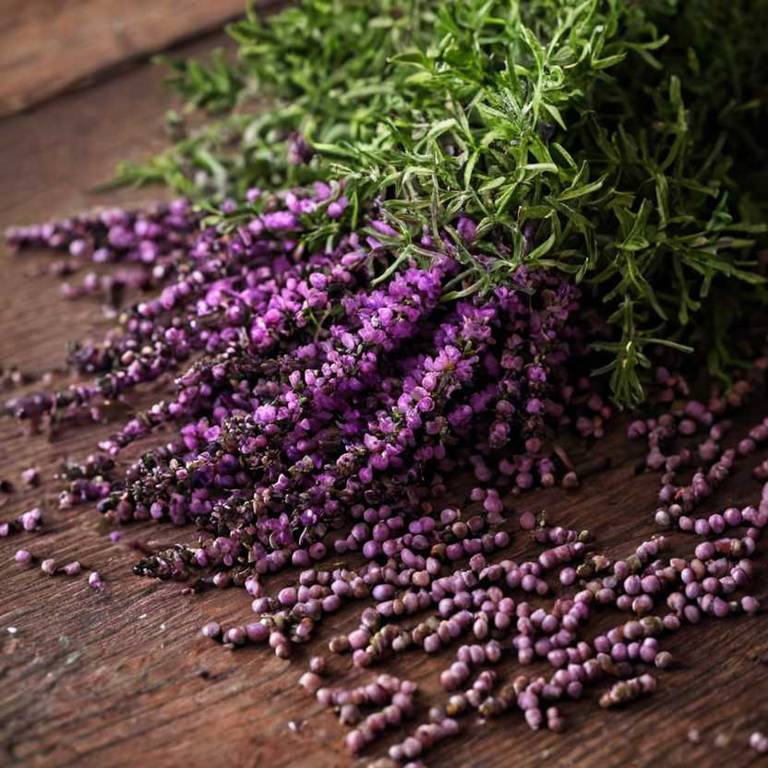By Leen Randell
Updated: Jul 08, 2024
What Are The Medicinal Properties Of Calluna Vulgaris (Heather)?

Calluna vulgaris, also known as heather, has health benefits such as reducing inflammation and improving cardiovascular health due to its antioxidant and anti-inflammatory properties.
The medicinal constituents of heather include flavonoids, phenolic acids, and triterpenoids, which contribute to its therapeutic effects. Heather is commonly prepared as a tea, infusion, or extract, and can also be found in topical creams and ointments. Possible side effects include stomach upset and allergic reactions.
It is essential to consult a healthcare professional before using heather, especially for individuals with certain medical conditions or taking medications.
This article explains the health benefits, active constituents, medicinal preparations, possible side effects, and precautions related to Calluna vulgaris .
What are the health benefits of Calluna vulgaris ?
Calluna vulgaris, also known as heather, has health benefits such as antioxidant and anti-inflammatory properties, which can help protect against cell damage and reduce inflammation.
Its bioactive compounds, including flavonoids and phenolic acids, have been shown to exhibit antimicrobial and antiviral activity, supporting immune function.
Traditionally, heather has been used to aid in wound healing and skin issues, demonstrating its potential in promoting overall health and well-being.
Here's a detailed article about the 10 health benefits of Calluna vulgaris .
What are the active constituents of Calluna vulgaris ?
Calluna vulgaris, also known as heather, has active constituents such as phenolic acids, flavonoids, and iridoids, which are responsible for its medicinal properties.
These compounds have been shown to have anti-inflammatory, antimicrobial, and antioxidant effects. The iridoids, specifically, have been found to have antispasmodic and bronchodilatory actions, making heather a potentially valuable treatment for respiratory conditions such as asthma and bronchitis.
Further research is needed to fully elucidate its therapeutic potential.
Here's a detailed article about the 10 active constituents of Calluna vulgaris .
What are the medicinal preparations of Calluna vulgaris ?
Calluna vulgaris, also known as heather, has medicinal preparations such as infusions, decoctions, and tinctures.
The flowers and leaves are used in herbal remedies, often in combination with other plants. Heather has been traditionally used to treat respiratory issues, such as bronchitis and coughs, as well as skin conditions and wounds.
It is also used to promote digestion and alleviate stress, although its effectiveness for these uses is less well documented.
Here's a detailed article about the 10 medicinal preparations of Calluna vulgaris .
What are the possible side effect of using Calluna vulgaris improperly?
Improper use of Calluna vulgaris, also known as heather, increases the chances of experiencing side effects such as digestive issues, allergic reactions, and interactions with certain medications.
Ingesting large amounts of heather tea or extract can cause stomach upset, nausea, and diarrhea, while topical application may lead to skin irritation and rashes.
Additionally, heather may interact with blood thinners and other medications, exacerbating health conditions.
Here's a detailed article about the 10 most common side effects of Calluna vulgaris .
What precautions to take when using Calluna vulgaris medicinally?
Before using Calluna vulgaris, also known as heather, for medicinal purposes, you must take precautions such as consulting a healthcare professional, particularly if you have any underlying health conditions or are pregnant.
The plant's volatile oil may cause skin irritation, allergic reactions, and interact with certain medications, including blood thinners, diabetes medications, and stimulants.
Additionally, excessive consumption can lead to toxicity.
Here's a detailed article about 10 precautions to take when using Calluna vulgaris .